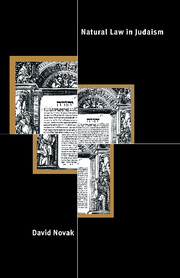4 - Maimonides' teleology of the law
Published online by Cambridge University Press: 28 October 2009
Summary
Observe it and practice it, for it is your wisdom and discernment in the eyes of the peoples.
(Deuteronomy 4:6)LEGAL DISPUTATION
It is best to begin looking at Maimonides' natural law theory by considering the way he categorizes the law itself. For Maimonides devised the most coherent conceptuality for dealing with Jewish law, both as a whole and in all its parts. If natural law be taken as the most evidently rational aspect of Jewish law, then Maimonides' rational ordering of the law itself is the best introduction to his treatment of what we would now call natural law (even though Maimonides himself did not use that specific term). We shall see that Maimonides attempts as much as he can to provide for Jewish laws reasons that are universally valid and universally intelligible, but without the sacrifice of revelation we saw in some of the modern Jewish thinkers examined in the previous chapter.
Normative Judaism has been aptly designated as affirming the doctrine of the dual Torah. This means that one part of God's law is revealed directly in written form (torah she-bikhtaυ) and the other part is presented through the dicta of human authorities (torah she-b'al peh). Although the Oral Tradition does supplement the Written Torah's silence on certain matters, much of it interprets the Written Torah where that Torah is not silent but vague. It is here that disputes about the meaning of the law arise. Since the community requires law, and since law brings a certain general uniformity to communal practice, there must be a method for the resolution of legal disputes.
- Type
- Chapter
- Information
- Natural Law in Judaism , pp. 92 - 121Publisher: Cambridge University PressPrint publication year: 1998



